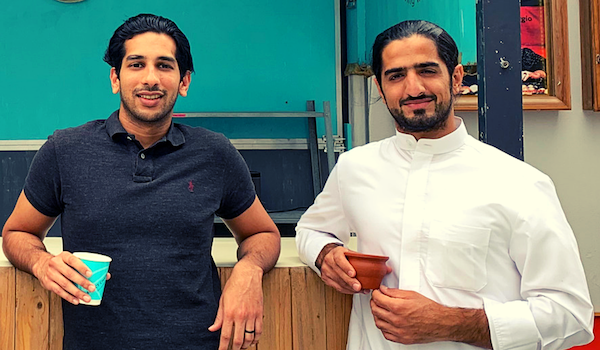What would two twenty-something guys at a buttoned-up Big 5 audit and financial advisory firm typically talk about over a tea break? You’d think the scores from yesterday’s game, the bizarre plot twist on a Netflix special or the latest car to catch every man’s fancy; but for Dubai-born and raised Ahmed Kazim and Justin Joseph, the conversations more often than not turned towards their overwhelming love for chai.
“We discovered we had so many mutual interests – including becoming entrepreneurs one day – and we quickly became friends at work. When the topic of chai came up, we wondered why there was no globally recognizable chai brand, the way you have so many coffee outfits all over the world,” remembers Ahmed. Buoyed by many conversations involving (many,many) cups of this aromatic, milky brew; they quickly set things in motion – travelling to the northeastern parts of India famed for its tea plantations, where they set about becoming “tea nerds,” learning everything about this staple beverage and the finer points of chai preparation.
As we settled into a quiet nook at the first Projet Chaiwala location in the UAE (in Cinema Akil at Al Serkal Avenue), surrounded by photos from this first chai expedition, we sipped and spoke about what this duo have learned about money and entrepreneurship along the way.
It’s All In The Family
Justin, whose family moved to the Arabian Gulf like many South Asian economic migrants in the 1970s and 1980s, grew up learning about the value of money and financial independence. For Ahmed, who hails from a merchant family in the UAE, his appetite for business and understanding of money was also encouraged at a young age. “My family hustled the hard way and built their trading business from scratch – they traded goods between Bombay and Dubai and the infrastructure and accessibility 60 years ago was not like it is today- so we understood that nothing worth having comes easy and we had to make our own way in the world.”
Build Your Knowledge Bank
When it comes to investing and personal finance, both of them count investment guru Warren Buffett and books like “The Intelligent Investor” and “The Richest Man in Babylon” as important influences. Justin, who has a Master’s in Finance is a fan of a blog called Zero Hedge: “It covers developments with a lot of different financial investments and Peter Thiel (Co-Founder of PayPal) contributes the occasional article and reading anything written by him is always time well spent.”
Learning By Doing
In investing and in entrepreneurship, Ahmed and Justin are big believers in both seeking and applying knowledge. “It’s easy to get caught up in analysis paralysis and overthinking things. At some point, you realize that the best way of learning is by doing,” emphasizes Justin.
“Neither of us is from the F&B (food and beverage space) so we anticipated a huge learning curve,” adds Ahmed. Counting on their individual strengths, especially financial modelling and their shared passion for creating a global chai concept, Justin says everything else “we have learned and will learn on-the-go.”
Even when it comes to refining their chai recipe, the two invested a fair amount of elbow grease, spending free evenings on the roof of Ahmed’s old family home in Satwa, making batches of chai and inviting their friends and actual chaiwalas for taste tests.
Passive Investing – Patience Pays Dividends (literally)
It’s this same curiousity and willingness to learn that have steered Ahmed and Justin in their investing journey. Both of them are big fans of passive investing.
Ahmed, whose parents and grandparents actively invested in stocks, says he learned about the importance of long-term investing thanks to his mother who invested the profit from his first T-shirt printing business (which he launched while still in high school and for which he won the prize for most profitable business from the Sheikh Mohammed Establishment for Young Entrepreneurs). “Start with the lowest risk financial instruments, an index fund on a reliable global exchange and hold it for at least 5 years. Long-term, stable dividends are the best way to realize capital gains,” suggests Ahmed.
Here are the essential investing behaviors the Project Chaiwala founders recommend if you’re an amateur investor:
- Know your Investments- “Invest in what you know, even if it is something really simple. At the very least you should understand how a company makes money and what they’re actually selling. If there’s too many buzzwords, don’t get swayed by the hype!” says Justin
- Keep it Regular -In the beginning, try to invest at least 10 percent (ideally 30 percent) of your income regularly
- Rebalance every Quarter – Justin advises checking on your investment performance every quarter and if the market is low, buying stock on the cheap (to benefit from the eventual upswing)
Ready to invest in your future?
